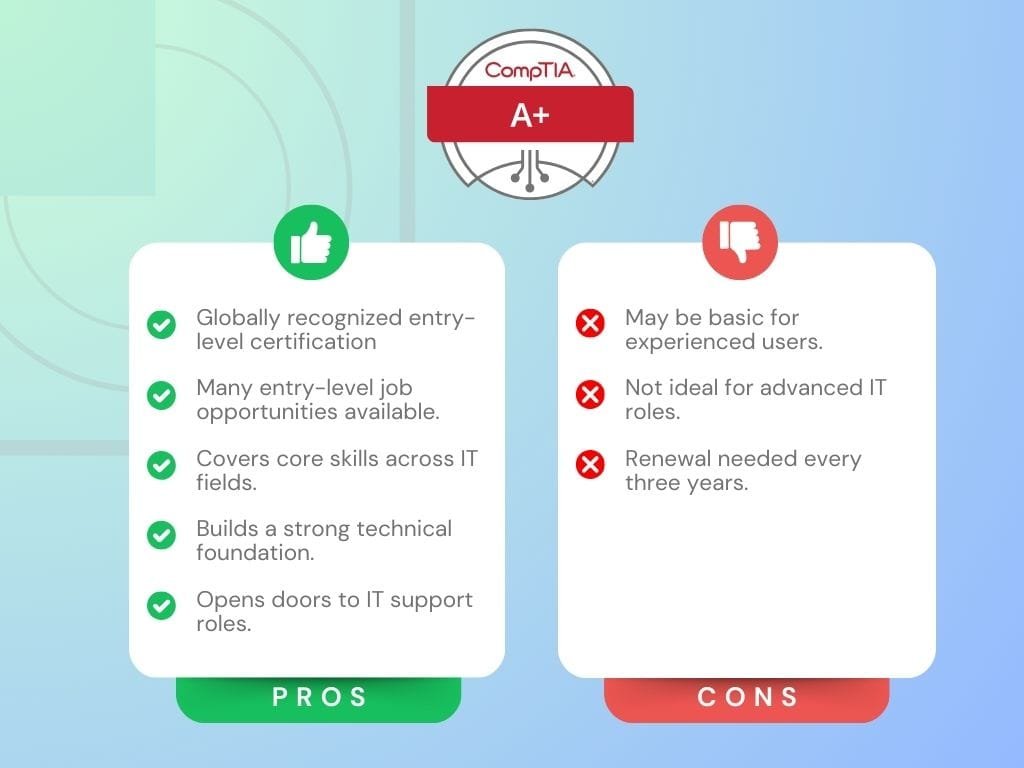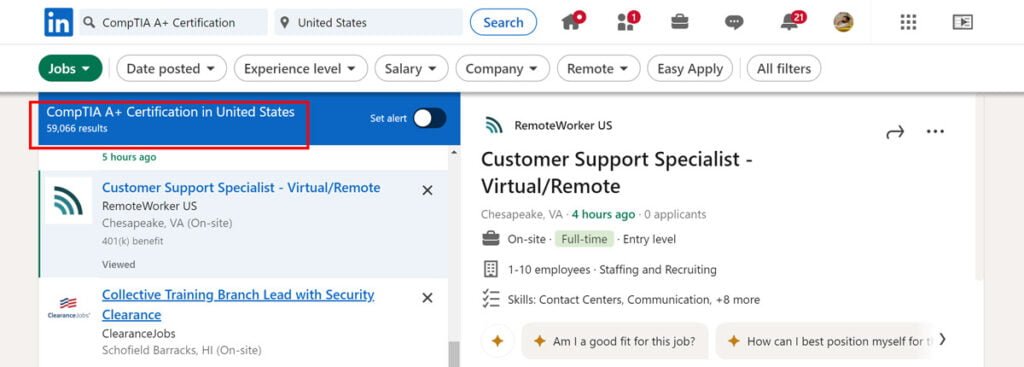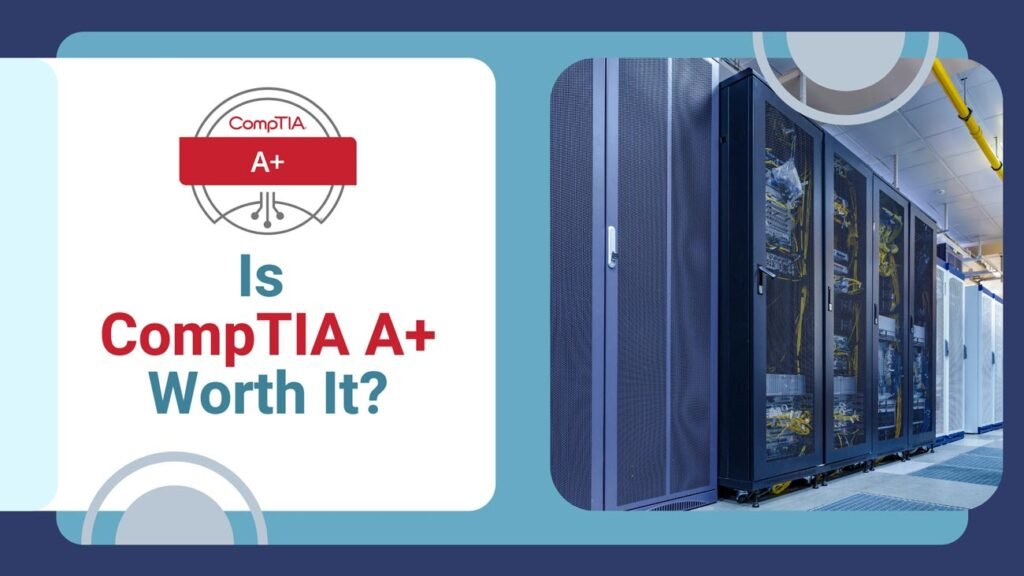Yes, CompTIA A+ is worth it. But is it worth it for you? That depends on your current educational background, experience, and career goals. CompTIA A+ is a globally recognized certification, highly respected by employers, and it opens doors to numerous entry-level IT job opportunities with competitive salaries.
However, its value ultimately depends on your unique circumstances. Factors such as your career aspirations, current role, and existing experience all play a significant role in determining whether CompTIA A+ is worth it for you.
To help you decide, we’ll dive into key considerations such as job demand, alternative certifications, potential salaries, and the time and effort required to earn this credential. Let’s get started!
Table of Contents
What is CompTIA A+ Certification?
The CompTIA A+ certification is obtained by passing two exams developed by IT industry professionals, which validate the essential skills required for entry-level IT positions. However, CompTIA A+ isn’t just about PC repair. It equips candidates with the ability to troubleshoot and solve a wide range of issues, from networking and operating systems to mobile devices and security.
While many certifications often focus on a single domain, CompTIA A+ provides a comprehensive overview of the diverse knowledge needed by today’s technicians. This broad scope makes the A+ certification relevant to a variety of job roles.
Who Should Consider CompTIA A+?

The CompTIA A+ certification is ideally suited for individuals who are new to the IT field or those looking to change careers and need a foundational credential to enter entry-level IT roles. It is particularly beneficial for individuals who lack formal education in computer science or related fields and are seeking to establish a base of technical knowledge and skills. For someone with a computer science degree, CompTIA A+ might not be necessary unless you aim to work in technical support or a similar field where hands-on hardware and software troubleshooting skills are essential.
If your career goal does not involve roles such as IT Support Specialist, Helpdesk Technician, or Field Technician, you might consider certifications that better align with your interests like databases, cloud computing, and cybersecurity.
What You Will Be Tested on the Certification Exam
To earn the CompTIA A+ certification, you have to pass two exams: Core 1 (220-1101) and Core 2 (220-1102). The Core 1 exam focuses on mobile devices, networking technology, hardware, virtualization, and cloud computing. Meanwhile, the Core 2 exam covers operating systems, security, software troubleshooting, and operational procedures.

Each exam contains a maximum of 90 questions, which may include multiple-choice, drag-and-drops, and performance-based types, reflecting real-world IT support scenarios. Candidates have 90 minutes to complete each exam.
The exams test various skills necessary for IT support roles, such as hardware setup, operating system installation and troubleshooting, software troubleshooting, and network support. Security fundamentals are also a significant component, given the increasing need to protect systems and data in today’s technology landscape. Here is the table showing a brief overview of the exam:
| Attribute | Details for CompTIA A+ Core 1 | Details for CompTIA A+ Core 2 |
|---|---|---|
| Exam Codes | CompTIA A+ 220-1101 | CompTIA A+ 220-1102 |
| Launch Date | Apr-22 | Apr-22 |
| Exam Description | Covers mobile devices, networking technology, hardware, virtualization, and cloud computing. | Covers operating systems, security, software, and operational procedures. |
| Number of Questions | Maximum of 90 questions | Maximum of 90 questions |
| Type of Questions | Multiple choice (single and multiple response), drag and drops, performance-based | Multiple choice (single and multiple response), drag and drops, performance-based |
| Length of Test | 90 minutes per exam | 90 minutes per exam |
| Passing Score | 675 (on a scale of 900) | 700 (on a scale of 900) |
| Recommended Experience | 9 to 12 months hands-on experience in the lab or field | 9 to 12 months hands-on experience in the lab or field |
| Retirement | Usually three years after launch | Usually three years after launch |
How Much Does CompTIA A+ Exam Cost?
In the United States, it costs USD 253 for each exam and a total of USD 506 for both the Core 1 and Core 2 exams. In Great Britain, candidates must pay GBP 150 per exam; in emerging markets, it is USD 142 for each exam. You can check this link from CompTIA’s website for updated exam prices.
Here is a table showing the price for the CompTIA A+ exam in different regions:
| Country | Currency | Core 1 Price | Core 2 Price | Total |
|---|---|---|---|---|
| USA | USD | 253 | 253 | 506 |
| Emerging Market | USDe | 142 | 142 | 284 |
| Great Britain | GBP | 150 | 150 | 300 |
| EURO | EURO | 228 | 228 | 456 |
| Japan | JPY | 29764 | 29764 | 59528 |
| Australia | AUD | 343 | 343 | 686 |
| South Africa | ZAR | 1950 | 1950 | 3900 |
Does CompTIA Tech+ Require Prior Experience?

The CompTIA A+ certification does not strictly require prior work experience or another certification. However, CompTIA recommends having 9-12 months of hands-on experience in the field or lab, as many individuals with basic computer skills, such as building a PC, have successfully pursued the certification without formal experience. This credential serves as an entry-level certification designed to validate foundational IT skills. The guidance on experience is more of a suggestion to ensure that candidates are familiar with basic IT operations, but it is not a strict prerequisite.
However, if you’re unsure about your readiness for the CompTIA A+ because you feel you might not have the necessary skills and knowledge, consider beginning with the CompTIA IT Tech+ certification. This can be a great starting point for building a basic understanding without having to take the certification exam right away. It’s a good way to ease into the material and build your confidence before moving on to the A+ certification.
Is CompTIA A+ hard?
The CompTIA A+ certification is accessible to beginners with no formal experience. Although the certification covers a broad scope of topics, including hardware, networking, and security, the depth of the content is manageable. Success in the A+ exams relies more on thorough preparation. The difficulty of the A+ exam can vary greatly based on your background, experience, and level of preparation. However, with the right resources, training materials, and practice exams, you can certainly succeed. The primary challenge stems from the volume of information rather than its complexity.
Keep in mind that the exam questions can sometimes be wordier and more complex than those on practice tests, so strong comprehension skills and thorough preparation are crucial. My advice is to focus on understanding the material rather than merely memorizing it. Engage with various prep exams, even those that may seem harder than the actual test, to become comfortable with the question style and format.
How Long to Study for CompTIA A+?
The time it takes to study for the CompTIA A+ certification varies depending on your background and study habits. If you’ve tinkered with computers or taken some IT classes, you might be able to prepare in about two or three months. However, if you are completely new to computers and IT, or if you like to thoroughly understand your material, it could take three to six months of consistent studying. The key is to ensure you’re comfortable with all the topics on the exam and to take some practice tests to see if you’re ready before attempting the real thing.
Here’s a breakdown to give you an idea:
- Beginners (no IT experience): 3-6 months (120-160 hours of study)
- Some Experience (basic computer skills): 2-4 months (100-140 hours of study)
- Fast Track (experienced troubleshooter): 1-3 months (40-80 hours of study)
What Jobs Can I Get with CompTIA A+?
The CompTIA A+ certification is widely recognized in the IT industry and can open doors to various roles focused on IT infrastructure, especially in IT Support and Help Desk Technician.
Here are just a few of the exciting job titles you can qualify for with CompTIA A+ certification:
- IT Support Specialist: This is a broad role where you’ll provide technical support to end users, maintain company networks, and ensure smooth operations. You’ll be responsible for tasks like installing hardware and software, troubleshooting problems, and setting up new user accounts.
- Help Desk Technician: As a help desk technician, you’ll be the first line of defence for users experiencing technical difficulties. Your duties will include diagnosing and solving computer issues, providing remote technical support, and ensuring user satisfaction.
Beyond these two core roles, CompTIA A+ opens doors to a variety of other opportunities, including:
- Field Technician
- Tier I Support Specialist
- Desktop Support Specialist
- Associate Network Engineer
- Systems Support Technician
- Junior Systems Administrator
- Data Support Technician
- End-User Computing Technician
CompTIA A+ Salaries: What to Expect?

As of January 6, 2025, salary information collected from ZipRecruiter shows that, on average, an A+ certified professional in the United States earns around $43,800 per year. That translates to about $21 per hour, $842 per week, or $3,650 per month. The salary range for A+ holders varies considerably, from $29,000 on the lower end to $64,000 on the higher end. It means there’s plenty of room for growth as you gain experience and expertise.
Remember, these are just averages, and your salary will ultimately depend on several factors, including your experience, skills, and the specific company you work for. Location also plays a significant role, with some areas offering higher salaries than others. But with an A+ certification in your toolkit, you’ll be well-positioned to negotiate a competitive salary and enjoy a promising future in the IT industry.
How In-Demand is CompTIA A+ Certification?

Yes, the CompTIA A+ certification is in demand for entry-level IT jobs. It’s widely recognized by employers in the IT industry as a validation of your fundamental knowledge of computer hardware and software.
The A+ certification strengthens your resume but isn’t a golden ticket to an IT position. Employers consider other factors during the hiring process, such as: 1) Previous IT experience, even if it’s volunteer work or personal projects, can be a significant advantage 2) Communication, problem-solving, teamwork, and customer service skills are crucial for success in IT.
To land your first IT job with an A+, during interviews, showcase your A+ knowledge and how it translates to practical problem-solving abilities. Consider pursuing further certifications like Network+ or Security+ to enhance your resume and career prospects. Build a home lab to practice your IT skills and gain practical experience. Network by attending IT meetups and online communities to connect with professionals in the field.
Is CompTIA A+ Worth It?
The answer? It depends. The A+ certification is an excellent launchpad for IT careers, especially for those without experience. It validates your understanding of hardware, software, and troubleshooting essentials. However, whether it’s the right move for you depends on your goals. Let’s break it down:
Reasons to Consider A+:
- Entry-Level Gateway: If you have no IT experience or are planning to switch to IT, the CompTIA A+ can serve as a stepping stone into the field. It covers fundamental technology concepts, essential for troubleshooting and problem-solving in IT support roles.
- Open Doors to Further Certifications: The A+ is a stepping stone to higher-level certifications like Network+ or Security+, which can open doors to more specialized roles.
- Employer Recognition: Many employers value the CompTIA A+ because it demonstrates a candidate’s commitment to IT as a profession and their ability to handle basic IT support tasks.
- Skills Development: Studying for the A+ exams (220-1101 and 220-1102) helps build a solid foundation of tech knowledge and skills, covering areas like hardware, networking, and more, which are applicable in many tech job roles.
Here’s another perspective:
If you have a Computer Science degree, you already have strong technical skills, so you might not need the A+ certification. If you don’t want to work as a help desk technician or if you’re interested in programming jobs, the A+ might be unnecessary.
Finally, the decision rests with you. If you seek a solid foundation in IT and a clear path to entry-level jobs, the A+ is a worthwhile investment. But if you have a strong CS background and a different IT target in mind, explore your options! There are many paths to a fulfilling IT career.



